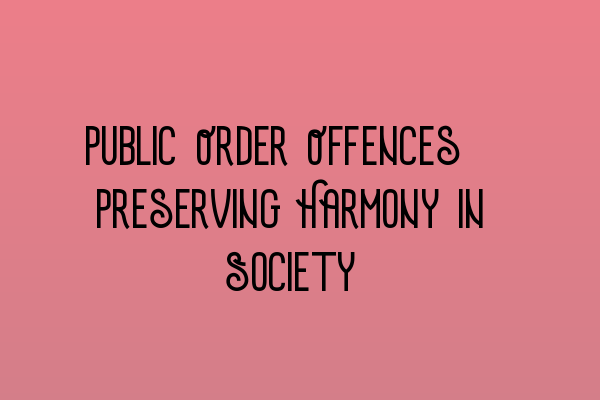Public Order Offences: Preserving Harmony in Society
Maintaining public order is crucial for the harmony and well-being of any society. Public order offences encompass a wide range of behaviors that disrupt public peace and can have serious social implications. In this article, we will delve into the various aspects of public order offences, their impact, and the legal measures in place to address them.
The Importance of Public Order
Public order is the foundation upon which societies are built. It involves ensuring that people can go about their daily lives without fear or disruption. When public order is compromised, it affects social cohesion, individual safety, and overall quality of life. Public order offences can range from minor disturbances to more serious crimes that pose a threat to public safety.
Types of Public Order Offences
Public order offences are defined by the law and can vary from one jurisdiction to another. However, some common examples include:
- Disorderly conduct
- Public drunkenness
- Rioting
- Violent behavior
- Inciting hatred or violence
- Public assembly without permission
Each of these offences contributes to the disruption of public order in different ways. They may lead to public unrest, fear, and even physical harm. It’s essential to understand the legal consequences associated with public order offences to deter such behavior and promote a safer society.
Legal Measures to Address Public Order Offences
The legal system has in place several measures to address public order offences. These measures aim to uphold the law, protect public safety, and maintain social order. Law enforcement agencies play a crucial role in preventing, detecting, and investigating these offences. They are tasked with enforcing the laws related to public order and taking appropriate actions against offenders.
In addition to law enforcement efforts, the criminal justice system ensures that those who commit public order offences are held accountable for their actions. Offenders may face penalties such as fines, community service, probation, or even imprisonment depending on the severity of the offence.
Understanding the Impact of Public Order Offences
Public order offences have far-reaching consequences that extend beyond the immediate disruption caused. These offences can damage public trust, create divisions within communities, and impact the sense of security among individuals. They can also impede economic growth and development, as businesses may be unwilling to invest in areas where public safety is compromised.
By addressing public order offences promptly and effectively, societies can protect their citizens, maintain social cohesion, and foster an environment conducive to growth and prosperity.
Conclusion
Preserving harmony in society is an ongoing effort, and tackling public order offences is a vital component of that endeavor. By understanding the different types of public order offences, the legal measures in place to address them, and the overall impact they can have, we can work towards creating a safer and more harmonious society.
For more information on criminal law and practice, consider attending workshops and seminars on criminal practice to expand your expertise. Stay informed and prepared by keeping up with updates in UK criminal laws. Enhance your SQE criminal law study group experience to deepen your knowledge and understanding of key concepts. Additionally, gain insight into the intricacies of criminal evidence rules through a detailed analysis. Finally, learn about the legal protections and support available to victims in criminal procedures to ensure their rights are upheld.
Sources:
- Workshops and Seminars on Criminal Practice: Expanding Your Expertise
- Updates in UK Criminal Laws: Staying Informed and Prepared
- Enhancing Your SQE Criminal Law Study Group Experience
- Decoding Criminal Evidence Rules: A Detailed Analysis
- Ensuring Rights of Victims in Criminal Procedures: Legal Protections and Support
